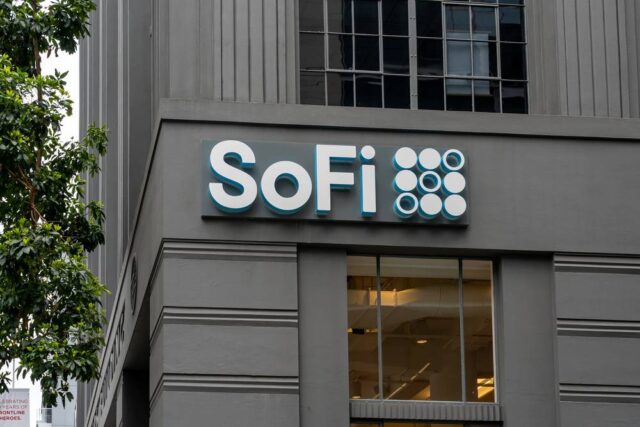TL;DR
- SoFi crypto trading debuts inside the SoFi Bank app, marking the first U.S. bank to offer crypto trading under a national charter.
- Launch covers Bitcoin (BTC), Ether (ETH), and Solana (SOL) with a phased rollout through early 2026.
- CEO Anthony Noto, in public investor remarks, said the move is step one toward a SoFi USD stablecoin and deeper bank crypto integration in lending and payments.
SoFi Crypto has launched at SoFi Bank, N.A., making the institution the first U.S. bank to offer crypto trading directly inside its mobile app.
The new feature lets customers buy, sell, and hold Bitcoin, Ether, and Solana from their existing SoFi accounts without using a separate exchange. Overall, this in-app crypto trading rollout, announced in November 2025, marks a turning point for regulated banking participation in digital assets.
What Exactly Launched
Branded as SoFi Crypto, the service allows verified retail clients to buy, sell, and hold crypto within the SoFi Bank ecosystem. Users can fund transactions instantly from SoFi checking or savings balances, with balances visible alongside traditional accounts. The SoFi Crypto launch began with BTC, ETH, and SOL. More assets will follow in phases. Meanwhile, a waitlist ensures a gradual onboarding across eligible states, and early adopters can earn promotional Bitcoin rewards.
SoFi emphasizes that all crypto balances are custodied by SoFi Digital Assets LLC, a non-bank subsidiary, and are not FDIC-insured deposits, even if accessed through the same app interface. This structure keeps customer funds under clear regulatory separation while offering a unified app experience.
>>> Read more: Revolut MiCA License Sets Path to Europe’s Super-App
Why It Matters for U.S. Banking
This launch cements SoFi’s position as the first nationally chartered bank to offer crypto trading to retail customers under OCC oversight. Previously, U.S. banks could provide crypto access only through third-party platforms or custodial partners.
However, that changed after the OCC released new crypto guidance this summer. Though not a direct approval, the regulator enabled banks, explaining how they can integrate digital-asset services safely. The new framework clarified expectations on capital, custody, and risk management. As SoFi has already held a national bank charter since 2022, it could act quickly once these rules were published. Consequently, SoFi bridged fintech agility and traditional bank governance.
How SoFi Positions Itself
CEO Anthony Noto said the initiative proves that “banking and crypto can coexist responsibly inside one trusted platform.” The company, therefore, emphasizes bank-grade security and compliance. That includes multi-factor authentication, transaction monitoring, and segregated custody via SoFi Digital Assets LLC.
For users, the appeal is simplicity and speed. The SoFi app now manages checking, savings, investing, and crypto trading within the same platform. SoFi’s seven-million-member base, largely composed of tech-savvy millennials, fits the target demographic. Furthermore, the app includes tutorials and “learn before you trade” modules to help users understand the basics of blockchain and its risks. As a result, customers can make informed decisions before buying crypto.
Risk and Regulatory Disclosure
Even though SoFi Bank is FDIC-insured, its crypto service sits outside this deposit protection. All digital-asset balances are held by SoFi Digital Assets LLC and follow separate terms of service.
Every trading screen reminds customers that crypto is not FDIC-insured and that prices can fluctuate sharply. Moreover, SoFi’s educational hub explains volatility, custody, and loss scenarios in plain language. Therefore, the initiative aligns with regulators’ calls for transparency and consumer education.
Competitive Landscape
Meanwhile, most traditional banks remain cautious. Many are waiting for further clarity or testing pilot programs under supervision. Brokerages such as Schwab and Morgan Stanley have discussed digital-asset access but have not yet opened trading to retail users.
By contrast, SoFi’s national bank charter gives it a strategic edge over fintech rivals such as Revolut or Robinhood, which operate under money-transmitter rules. Thus, its approach demonstrates that full-service banks can now offer crypto trading under existing law. As a result, this first-mover advantage could encourage others to follow as confidence in regulatory enablement grows.
Roadmap and Future Plans
In public remarks at the KBW Fintech and Payments Conference 2025 and in SoFi’s official press release, Noto outlined a roadmap featuring a SoFi USD stablecoin. The coin would support payments and settlement functions and extend SoFi’s bank-grade infrastructure into the blockchain space. He also said the initiative remains subject to further regulatory review.
In addition, SoFi is exploring tokenized-deposit infrastructure to simplify transfers between consumer and enterprise accounts. Moreover, these projects form part of SoFi’s broader bank crypto integration strategy. It’s applying blockchain rails to modernize money movement while maintaining strong oversight. Ultimately, they signal a clear ambition to merge compliance, innovation, and scale.
Industry Implications
Consequently, SoFi’s launch shows that a bank can participate in crypto markets without compromising on prudential rules. For regulators, it provides a live example of how crypto guidance can foster compliant innovation. For competitors, it raises expectations to offer similar features or risk losing younger, digitally inclined clients. In addition, analysts already view SoFi’s model as a blueprint for merging regulated banking with digital-asset access. Therefore, the event marks an important step toward normalizing crypto inside U.S. financial institutions.
>>> Read more: SoFi First U.S. Bank Using Bitcoin Lightning for Remittances
By launching SoFi crypto trading, the company has redrawn the line between banks and crypto platforms. As the first U.S. bank to offer crypto trading, SoFi proved that a nationally chartered, FDIC-insured institution can merge compliance and innovation, while keeping crypto custody in a non-bank subsidiary. Ultimately, the launch signals a broader wave of bank crypto integration that is pushing digital assets further into mainstream finance under clearer regulatory guidance.
Readers’ frequently asked questions
Who is eligible to use SoFi Crypto at launch?
Access is rolling out in phases to verified U.S. customers who have eligible SoFi Bank accounts and complete KYC. Availability may vary by state. A waitlist manages onboarding; the crypto option appears in-app once access is enabled.
How are taxes handled when trading crypto through SoFi?
SoFi provides annual tax documents summarizing crypto transactions to help users report capital gains or losses. Customers can download Form 1099-B or equivalent statements directly from the app at tax time. SoFi does not provide tax advice, and users remain responsible for their own filings.
What should I know about fees, limits, and funding?
SoFi shows any applicable pricing, spreads, and limits before you confirm an order. Funding from SoFi checking or savings is instant for eligible customers. Minimum trade sizes and daily limits are shown in-app and can vary by asset, user profile, and rollout phase.
What is in it for you? Action items you might want to consider
Review eligibility and onboarding status
Check whether your SoFi Bank account is eligible for crypto trading and complete the required KYC process. If the feature is not yet visible in your app, join the waitlist to receive access as the rollout expands.
Evaluate risk and tax responsibilities
Understand that crypto assets are not FDIC or SIPC insured and may fluctuate in value. Review SoFi’s disclosures carefully and download Form 1099-B or equivalent records at tax time to meet your reporting obligations.
Stay informed on future features
Follow SoFi’s official updates for new crypto assets, stablecoin developments, or lending features. Monitoring announcements can help you plan for upcoming functionality and compliance changes affecting U.S. bank–issued digital assets.











[…] have explored blockchain settlement experiments. But few have enabled direct Bitcoin trading. Smaller digital banks have introduced retail crypto features. However, the service built by PNC sits in a different category. It is the first instance of a […]
[…] >>> Read more: SoFi Crypto Trading: First U.S. Bank With In-App Crypto Access […]